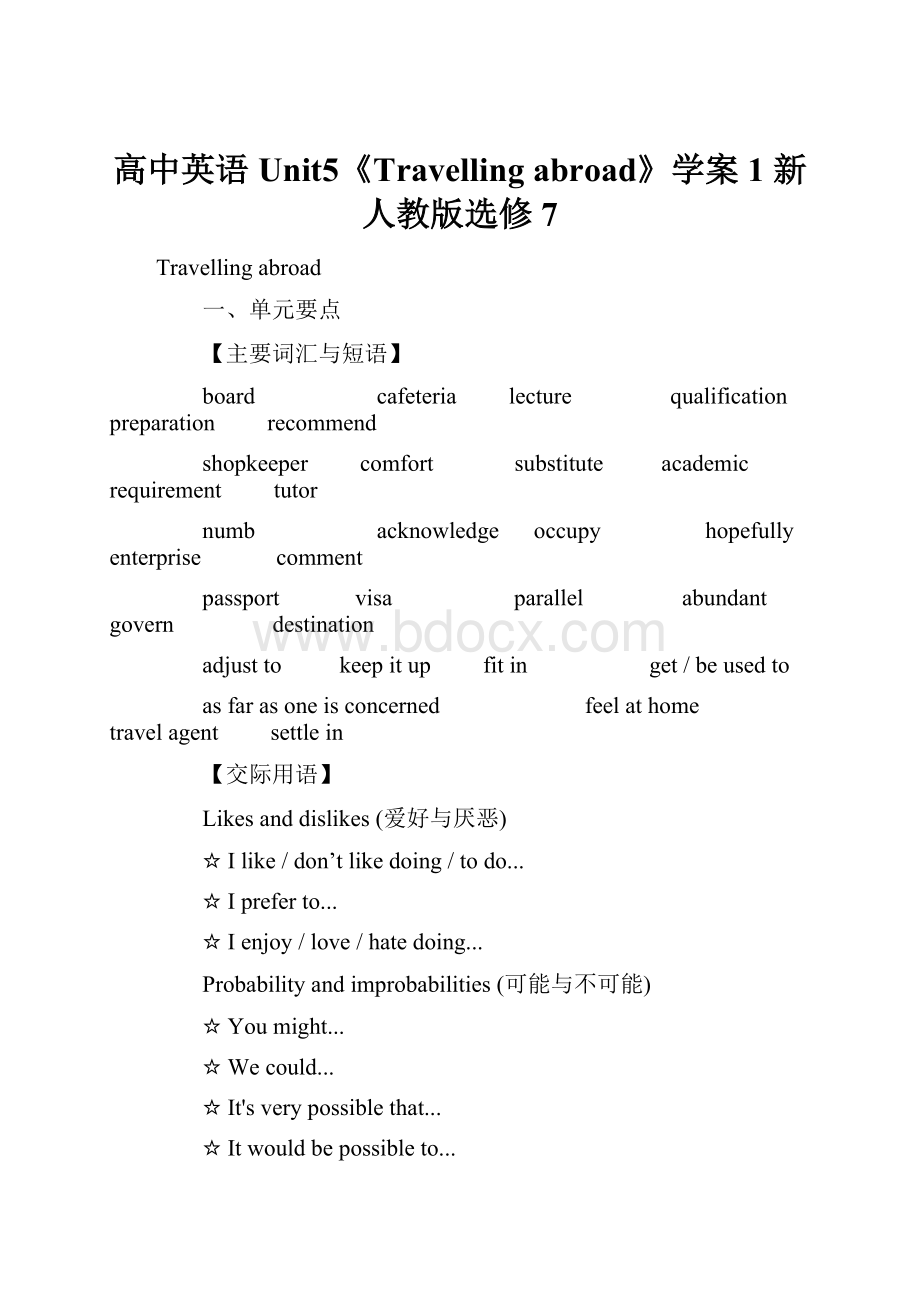高中英语 Unit5《Travelling abroad》学案1 新人教版选修7.docx
《高中英语 Unit5《Travelling abroad》学案1 新人教版选修7.docx》由会员分享,可在线阅读,更多相关《高中英语 Unit5《Travelling abroad》学案1 新人教版选修7.docx(23页珍藏版)》请在冰豆网上搜索。

高中英语Unit5《Travellingabroad》学案1新人教版选修7
Travellingabroad
一、单元要点
【主要词汇与短语】
board cafeteria lecture qualification preparation recommend
shopkeeper comfort substitute academic requirement tutor
numb acknowledge occupy hopefully enterprise comment
passport visa parallel abundant govern destination
adjustto keepitup fitin get/beusedto
asfarasoneisconcerned feelathome travelagent settlein
【交际用语】
Likesanddislikes(爱好与厌恶)
☆Ilike/don’tlikedoing/todo...
☆Ipreferto...
☆Ienjoy/love/hatedoing...
Probabilityandimprobabilities(可能与不可能)
☆Youmight...
☆Wecould...
☆It'sverypossiblethat...
☆Itwouldbepossibleto...
☆Itisn'tpossibleto...
☆It'sapossibility.
☆Itcouldhappen.
☆It'slikely/unlikelythat...
☆Idoubtit.
☆Idon'tthinkyou'denjoy...
☆It'snotverylikely...
☆...wouldprobablysuitus.
☆...wouldbeaperfectplaceforus.
【语法】
ReviseNon-restrictiveAttributiveClause(复习非限制性定语从句)
1.XieLei,whois21yearsold,hascometoouruniversitytocompleteabusinessqualification.
2."It'snotjuststudythat'sdifficult...."explainedXieLei,whohadlivedinthesamecityinChinaallherlife.
3.Livingwithhostfamilies,someofwhichhavechildrenwhoarealsoatuniversity,givesstudentstheopportunitytolearnmoreabouteverydaylifeandcustomsintheirnewcountry.
二、重点词汇
1.board 可用作动词和名词
1)用作动词
☆上船;坐船;搭乘(公共交通工具)
SixmonthsagoXieLeisaidgoodbyetoherfamilyandfriendsinChinaandboardedaplaneforLondon.六个月之前,谢蕾告别了中国的家人和朋友,登上了前往伦敦的飞机。
Heboardedthebus. 他上了公共汽车。
☆包饭;供膳,供膳宿
Althoughsomeforeignstudentsliveinstudentaccommodationorapartmentswithotherstudents,somechoosetoboardwithEnglishfamilies.尽管有些学生和别的学生一起住在学生宿舍或者公寓里,有的还是选择寄宿在英国人家里。
Shearrangedtoboardsomestudentsfromtheuniversity. 她供一些大学生膳宿。
Theyboardedhimfor$40aweek. 他们按每周收费四十美元给他包伙食。
☆用木板盖
Let'sboardthesidedoorup. 让我们用板把边门钉上。
2)用作名词
☆膳食费用
Eachstudenthastopay$100amonthforboardandlodging.每个学生每月需付一百美元的膳宿费。
Howmuchisbedandboard?
住宿费和伙食费共多少钱?
☆木板(供某种特殊用途的)板
Theysawedaboardintothreepieces.他们把一块木板锯成三块。
☆委员会;理事会;董事会
Ourcompanyhas3womenonitsboardofdirectors.我们公司董事会里有三位女性。
HisuncleisnowontheBoard.他叔叔现在是董事。
TheboardofthedirectorsunanimouslyagreedthatMr.Whitewasthebestcandidateforthejob.董事会一致同意怀特先生是干这项工作的最佳候选人。
☆常用复数形式,表示“戏剧;舞台”
Hehasbeenontheboardsallhislife.他终身从事戏剧事业。
☆由board组成的常见短语
onboard 在船上,在公共交通工具内
Everybodyonboardwasworriedandwewerecurioustofindoutwhathadhappened.飞机上的人都很着急,而且我们急于想了解出了什么事。
goonboard上船;上飞机,上火车
Wewentonboardtheship.我们登上了轮船。
aboveboard诚实地,公开地,光明正大地
2.keepitup继续下去,不松劲
it在这个短语中词义很模糊,只是帮助构成短语,如同takeiteasy中的it用法一样。
Keepitup,XieLei.谢蕾,再接再厉!
Ifonlyshecouldkeepitup,shewouldsucceedintheend.只要她坚持不懈,她最终会成功的。
☆而keepup表示“(斗志,价格等)不低落”,“维持,继续”等意。
up在该短语中既可是副词,也可是介词,可以用于被动语态。
Theirspiritkeptupwellinspiteofhardships.虽有困难,但他们并不气馁。
Pricesstillkeepup.物价仍旧上涨。
Ihopetheweatherwillkeepup.我希望天气继续晴朗。
Theyenteredintoacorrespondencewhichwaskeptupforalmost10years.他们开始通信了,并且把这种通信联系保持了十年之久。
3.substitute名词,意为“代替人;代替物;代用品”,常用短语substitutefor代替……;替换……,取代……。
Therearenosugarsubstitutesandnoartificialcolouringinthisfood.这种食品里没有糖的代用品,也没有人造色素。
☆还可以用作动词,意为“用……代替;代替”,常用短语substitutesth./sb.for用某物/某人来代替。
Homemadepartsarebeingsubstitutedforimportedones.国产零件取代进口零件。
Hesubstitutedasthetypistintheoffice.他代替做这个办公室的打字员。
☆还有形容词词性,意为“代替的;代用的;替补的”
Thenewsubstitutesweetenerismadefromawildplant.这一新的代用甜味剂是用一种野生植物制成的。
4.acknowledge
☆对…表示感谢,答谢,致谢
Firstofall,hetoldme,Icouldn’twritewhatotherpeoplehadsaidwithoutacknowledgingthem.他告诉我说,首先,我不能把别人说的话写下来而不表示感谢。
☆承认
Iacknowledgethetruthofhisstatement.我承认他说的是事实。
☆公认为;认为
Hewasacknowledgedtobethebestplayer.他被公认为是最佳选手。
Itisuniversallyacknowledgedthatdogshaveanacutesenseofsmell.大家都认为狗的嗅觉敏锐。
Joeisacknowledgedasthebestbasketballplayeroftheyear.乔被公认为是今年最佳篮球选手。
☆表明已收到
Mysistersentanemailtoacknowledgehisletter.我妹妹发了一封电子邮件表明已收到他的来信。
5.as/sofaras作从属连词,意为“就……来说,在……范围内”,引导状语从句,强调程度或范围,从句中动词常用know,see,concern等,相当于sofaras。
AsfarasIknow,hehasbeenabroad.据我所知,他已经出国了.
AsfarasI'mconcerned,I'dliketogoswimming.就我来说,我想去游泳.
☆asfarasone’sconcerned就某人来说,就某人而言
Besides,asfarashewasconcernedwhatotherpeoplethoughtwasnotthemostimportant
thing.而且他认为别人的想法并不是最重要的。
AsfarasI'mconcerned,thefilmissheernonsense.就我而言,这部电影毫无意义。
☆asfaras作短语介词或连词,后跟名词或从句,意为“像……那样远,远到……,直到……”,强调至某一指明地点或距离。
在否定句中,也可用sofaras。
Youcanseeasfarasthecoast.极目远眺,你可以看到海岸.
Shedidn'tgoasfarastheothers(did).她走得不像其他人那样远.
6.athome在家;在家乡
Istayedathometoread.我待在家里读书。
☆athomein/on/withsth.精通;擅长
☆feel/beathome(像在家一样)舒服自在;在家,在家接待客人;精通
IlikethisneighbourhoodandIamsureIwillsoonfeelathomelivinghere.我喜欢这个街区,我肯定在这里会生活得很舒适。
IalwaysfeelathomewhenIamwithyou.跟你在一起时,我总觉得很自在。
家(home)是使人感到舒适和无拘束的地方。
“feelathome”也就比喻感到像在家里一般安适和自在。
feel/beathomewithsb./insomeplace在某处觉得安适自在;和某人合得来;和某人混得很熟
7.incommon(withsb.)有共同之处;和……一样
I’mgoingtojoinafewuniversityclubsandhopefullyI’llmeetsomepeopleIhavethingsincommonwith.我打算加入几个大学俱乐部,希望遇见一些有共同兴趣的人。
Theyfoundthattheyhadalotincommon.
Theiropinionshadmuchincommonwithmine.
Incommonwithmanypeople,helikesdancing.
8.abundantadj.丰富的,充足的
anabundantharvest丰收
anabundantyear丰年
☆常用词组beabundantin富于……;……很丰富
Thecountryisabundantinnaturalresources.这个国家天然资源丰富。
Ourcountryisabundantinpetroleumdeposits.我国石油储量丰富。
9.govern
☆统治;治理
Whoarethemenwhoreallygoverninthiscountry?
谁是这个国家的真正统治者?
☆控制;左右;抑制
Youshouldgovernyourtemper.你应当抑制你的脾气。
Therightsofourcitizensaregovernedbycharter.我们公民的权利是由宪章规定的。
三.课文句子分析
1.Chinesestudentfittinginwell中国学生适应能力强。
1)Chinesestudentfittinginwell在英文标题中,为了满足英文标题,尤其是新闻、报刊标题的简约、醒目、概括和风趣的艺术风格的要求,常常连接三四个或者更多的名词,而把虚词、冠词、介词、连词、助动词等省略。
该标题就是AChinesestudentisfittinginwell.的省略形式。
PotholeGirlSavedAfterIcyNight一名落入洞穴的女孩在经历寒冷夜晚后被救出。
该标题就是APotholegirlissavedafteranicynight的省略形式,Pothole是洞穴的意思。
Potholegirl洞穴女孩,这样的表达方法只有在标题中才能见到,指的是girlinpothole。
2)fitinwith…
☆=suit,fallintoagreement适合,符合,适应
ThisinformationdoesnotfitinwithwhatIwastoldyesterday.这消息和我昨天听到的不一致。
Theexpectationsmaynotfitinwiththeresults.估计与结果可能不相符。
Wemustfitourplaninwithyours.我们的计划得和你们的一致。
Yourideasfitinwithmine.你的想法和我的是一致的。
Ourliteratureandartmustfitinwithoursocialisteconomicbase.
我们的文学艺术必须和我国的社会主义经济基础相适应。
☆=getalongwith,cooperate;getonwith相处融洽
Ourofficefitsinbeautifullywithitssurroundings.
我们的办公室跟周围的环境很协调,显得很漂亮。
Shetriedtofitinwiththeothers,butitwasdifficult.她力求与别人配合,但很难。
Foryears,hehasfittedinwellwithhisneighbours.多年来,他一直和邻居相处得很好。
Howareyoufittinginwithyournewcolleaguesinyournewjob?
你在新的工作岗位上与新的同事合得来吗?
2.Youhavetogetusedtoawholenewwayoflife,whichcantakeupallyourconcentrationinthebeginning.你必须习惯一种全新的生活方式,这会在开始的阶段占用你的全部注意力。
1)get/beusedtodoingsth.表示“习惯于”,to在该结构中是介词,因此后接名词、代词、动名词,表示由于经常做某事或者做某事已有了经验,因而习以为常的意思。
在这个短语中,used是形容词,be为谓语动词,可以表示现在、过去、将来等时态。
beusedto表状态,getusedto表动作,且强调一个渐变的过程。
Sheisn'tusedtosuchhardwork.她干不惯这种艰苦的工作。
WhenIwasyoung,Iwasusedtowalkinglongdistances.我年轻时,习惯于长距离步行。
Imovedhereonlylastmonth.Ihaven'tgotusedtothelifeinthecity.
我上个月才搬来,还不习惯城里的生活。
☆ beusedtodosth.的意思是“被用来作某事”,这里是use(使用)这个实义动词的被动用法,即短语usesth.todosth.“用某物来做某事”的短语的被动形式。
Stonesareusedtobuildhouses.石头用来建造房屋。
☆ usedtodosth.的意思是“(过去)惯常”、“曾经”,表示过去的经常性的、习惯性的行为或状态,并含有这类情况现已不复存在的意味。
其否定式是:
usednotto/usedn'tto/usen'tto
疑问式是:
Used…to…?
/Didn'tuseto…/Did…useto…?
前者属旧式的或很正式的用法,后者则是现在为大多数人使用的结构,尤其是在非正式的谈话或写作时,常常使用。
Heusedtobeatherblackandblue..他以前常把她打得青一块紫一块的。
Peopleusedtobelievethattheearthwasflat/theearthtobeflat.
人们曾经以为地球是扁平的。
Iusednotto/didn'tusetolikePekingopera,butnowI'mgettinginterested.
过去我不喜欢京剧,但现在慢慢地感兴趣了。
Usedyouto/Didyouusetogotoschoolbybus?
你以前常乘公共汽车去上学吗?
☆ usedto与would都可表示过去的习惯动作或行为,常可换用。
但是usedto含有较强的“今昔对比”的意味,表过去总是那样,而现在不是那样了;would则无此种对比意味,只表示说话人对过去的一种回想心情,而且would之后要接表示动作的动词,不接表示认识或状态的动词,而usedto则没有这个限制。
Whenwewerechildrenweusedto/wouldgoskatingeverywinter.我们小时每年冬天都去滑冰。
Hewouldsometimesworkintothenight.以前他常工作到深夜。
(并不表示他现在不工作到深夜。
)
Idonotswimsooftenasusedto.
我不像过去那样常游泳了。
(此句中usedto不能用would代替,因为would不含有“现在不再这样了”之意。
)
2)whichcantakeupallyourconcentrationinthebeginning是一个非限制性定语从句,which指的是前面这个句子,即“必须习惯一种全新的生活方式”这件事。
3)takeup意为“占去(时间、地方、注意力等);开始从事;专注于;继续”
Hetookupartwhileatschool.他在学校时开始对艺术感到兴趣。
Thefatherhadadrinkandtookuphisstory.那位父亲喝了点饮料,接着讲故事。
I’msorrytohavetakenupsomuchofyoutime.对不起占用了你那么多时间。
Thispianotakesupalotofroom.钢琴占了很大一块地方。
3.IhavebeensooccupiedgettingusedtoeverythingthatIhaven’thadtimeforsocialactivities.一直忙于适应环境,我都没有时间去进行社会活动。
beoccupiedin忙于……;正在(做某事)
Theworkerswereoccupiedinbuildingnewhouses.工人们正在忙碌着盖新房子。
Hewasoccupiedinwritinganovel.他忙于写小说。
occupy动词,占,占用,占领,占据(时间或空间)(=takeup)
Thebathroomisoccupied.浴室有人在用。